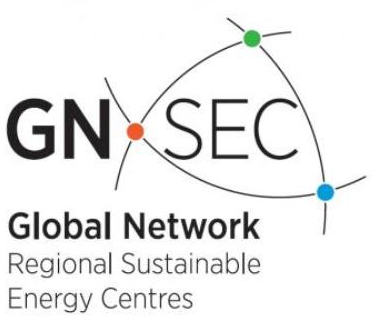Posted: June 28, 2019

The UNIDO-coordinated Regional Sustainable Energy Centres will become sponsor members of the IEA Solar Heating and Cooling programme, a decision made by the IEA SHC Executive Committee at a meeting in Austria in early June. Seven Regional Centres for Renewable Energy and Energy Efficiency have already started operations, two of them - ECREEE and RCREEE (see table below) – were already sponsors of IEA SHC. The regional centres are established with technical support of the United Nations Industrial Development Organisation (UNIDO) and financial support of the Governments of Austria, Spain and Norway.
“The centres have the official mandate of more than 90 Ministers of Energy to promote renewable energy and energy efficiency within the respective region. They cover most of the non-OECD countries, including least developed and small island developing states. These are the new emerging countries where we expect most of the energy investments throughout the next decades”, explained Martin Lugmayr, Coordinator of GN-SEC, the Global Network of Regional Sustainable Energy Centres. Daniel Mugnier, who chairs IEA SHC, added that the know-how gained from years of carrying out IEA SHC projects would soon need to be transferred to the new markets. A recently established strategic partnership between the solar heating and cooling organisation and the centres could help with this sort of outreach activity.
UNIDO and IEA SHC held initial talks during the ISEC conference in October 2018 in Graz, Austria (link to https://www.solarthermalworld.org/content/isec-2018-working-across-technological-boundaries), where both agreed to make all centres supporting members of IEA SHC. This will allow their experts to participate in additional tasks, which is what research platforms are called within IEA SHC. “We are working on concrete plans for sharing know-how and other information with the regional centres. A good option could be to offer training courses via the SHC Solar Academy,” said Mugnier.
Lugmayr and Mugnier emphasised the mutual benefits of the GN-SEC membership in the IEA SHC. “Many developing countries are just starting to establish or enforce policies and standards in the heating and cooling sector. The generated knowledge of OECD countries is very beneficial for these regions, if adapted to the local circumstances and requirements. On the other hand, the regional centres can help to close data gaps and contribute to the development of inclusive IEA SHC standards”, said Lugmayr.
|
GN-SEC Centre
|
Founding year
|
Office site
|
In partnership with….
|
Website
|
|
ECOWAS Centre for Renewable Energy and Energy Efficiency (ECREEE)
|
2010
|
Praia, Cape Verde
|
Economic Community Of West African States (ECOWAS)
|
www.ecreee.org
|
|
Regional Centre for Renewable Energy and Energy Efficiency (RCREEE)
|
2010
|
Cairo, Egypt
|
Arab League
|
www.rcreee.org
|
|
SADC Centre for Renewable Energy and Energy Efficiency (SACREEE)
|
2015
|
Windhoek, Namibia
|
Southern African Development Community (SADC)
|
www.sacreee.org
|
|
East African Centre for Renewable Energy and Energy Efficiency (EACREEE)
|
2016
|
Kampala?, Uganda
|
East African Community (EAC)
|
www.eacreee.org
|
|
Pacific Centre for Renewable Energy and Energy Efficiency (PCREEE)
|
2017
|
Nuku'alofa, Kingdom of Tonga
|
Pacific Community (SPC)
|
www.pcreee.org
|
|
Caribbean Centre for Renewable Energy and Energy Efficiency (CCREEE)
|
2018
|
Brigdetown, Barbados
|
Caribbean Community (CCREEE)
|
www.ccreee.org
|
|
SICA Centre for Renewable Energy and Energy Efficiency (SICREEE)
|
2019
|
Salvador, El Salvador
|
Central American Integration System (SICREEE)
|
www.sicreee.org
|
Overview of the operating seven Sustainable Energy Centres
Source: GN-SEC
UNIDO began supporting the implementation of Regional Sustainable Energy Centres as early as 2008. All of them are connected to intergovernmental organisations locally (see the table above), as the ministerial councils of associated organisations had to approve locations and business plans in the implementation stage. This has sometimes led to delays in founding a centre. Still, once approved, the centre can launch projects and initiatives in every country belonging to the relevant region.
Organisations mentioned in this article: